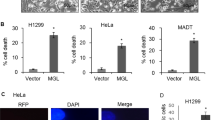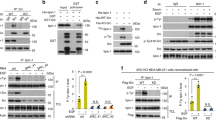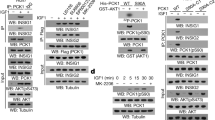Abstract
Cyclooxygenase-2 (COX-2) and 5-lipoxygenase (5-LOX) enzymes are overexpressed during inflammation and multistage tumor progression in many neoplastic disorders including lung, breast and pancreatic cancers. Here we report that the tumor suppressor phosphatase and tensin homolog (PTEN) is oxidized and inactivated during arachidonic acid (AA) metabolism in pancreatic cancer cell lines expressing COX-2 or 5-LOX. Oxidation of PTEN decreases its phosphatase activity, favoring increased phosphatidylinositol 3,4,5-triphosphate production, activation of Akt and phosphorylation of downstream Akt targets including GSK-3β and S6K. These effects are recapitulated with pancreatic phospholipase A2, which hydrolyses the release of membrane-bound AA. Interference with PTEN's physiological antagonism of signals from growth factors, insulin and oncogenes may confer risk for hypertrophic or neoplastic diseases associated with chronic inflammation or unwarranted oxidative metabolism of essential fatty acids.
This is a preview of subscription content, access via your institution
Access options
Subscribe to this journal
Receive 50 print issues and online access
$259.00 per year
only $5.18 per issue
Buy this article
- Purchase on Springer Link
- Instant access to full article PDF
Prices may be subject to local taxes which are calculated during checkout





Similar content being viewed by others
References
Aggarwal BB, Shishodia S, Sandur SK, Pandey MK, Sethi G . (2006). Inflammation and cancer: how hot is the link? Biochem Pharmacol 72: 1605–1621.
Asano T, Yao Y, Zhu J, Li D, Abbruzzese JL, Reddy SA . (2004). The PI 3-kinase/Akt signaling pathway is activated due to aberrant Pten expression and targets transcription factors NF-kappaB and c-Myc in pancreatic cancer cells. Oncogene 23: 8571–8580.
Bianchi M, De Lucchini S, Marin O, Turner DL, Hanks SK, Villa-Moruzzi E . (2005). Regulation of FAK Ser-722 phosphorylation and kinase activity by GSK3 and PP1 during cell spreading and migration. Biochem J 391: 359–370.
Brugarolas J, Kaelin Jr WG . (2004). Dysregulation of HIF and VEGF is a unifying feature of the familial hamartoma syndromes. Cancer Cell 6: 7–10.
Cantley LC, Neel BG . (1999). New insights into tumor suppression: PTEN suppresses tumor formation by restraining the phosphoinositide 3-kinase/AKT pathway. Proc Natl Acad Sci USA 96: 4240–4245.
Chan TO, Rittenhouse SE, Tsichlis PN . (1999). AKT/PKB and other D3 phosphoinositide-regulated kinases: kinase activation by phosphoinositide-dependent phosphorylation. Annu Rev Biochem 68: 965–1014.
Cho SH, Lee CH, Ahn Y, Kim H, Kim H, Ahn CY et al. (2004). Redox regulation of PTEN and protein tyrosine phosphatases in H2O2 mediated cell signaling. FEBS Lett 560: 7–13.
Chu EC, Tarnawski AS . (2004). PTEN regulatory functions in tumor suppression and cell biology. Med Sci Monit 10: RA235–RA241.
Cross DA, Alessi DR, Cohen P, Andjelkovich M, Hemmings BA . (1995). Inhibition of glycogen synthase kinase-3 by insulin mediated by protein kinase B. Nature 378: 785–789.
Ding XZ, Tong WG, Adrian TE . (2001). Cyclooxygenases and lipoxygenases as potential targets for treatment of pancreatic cancer. Pancreatology 1: 291–299.
Fresno Vara JA, Casado E, de Castro J, Cejas P, Belda-Iniesta C, Gonzalez-Baron M . (2004). PI3K/Akt signalling pathway and cancer. Cancer Treat Rev 30: 193–204.
Gericke A, Munson M, Ross AH . (2006). Regulation of the PTEN phosphatase. Gene 374: 1–9.
Giardina C, Inan MS . (1998). Nonsteroidal anti-inflammatory drugs, short-chain fatty acids, and reactive oxygen metabolism in human colorectal cancer cells. Biochim Biophys Acta 1401: 277–288.
Gorin Y, Kim NH, Feliers D, Bhandari B, Choudhury GG, Abboud HE . (2001). Angiotensin II activates Akt/protein kinase B by an arachidonic acid/redox-dependent pathway and independent of phosphoinositide 3-kinase. FASEB J 15: 1909–1920.
Hii CS, Moghadammi N, Dunbar A, Ferrante A . (2001). Activation of the phosphatidylinositol 3-kinase-Akt/protein kinase B signaling pathway in arachidonic acid-stimulated human myeloid and endothelial cells: involvement of the ErbB receptor family. J Biol Chem 276: 27246–27255.
Hughes-Fulford M, Li CF, Boonyaratanakornkit J, Sayyah S . (2006). Arachidonic acid activates phosphatidylinositol 3-kinase signaling and induces gene expression in prostate cancer. Cancer Res 66: 1427–1433.
Kim D, Kim S, Koh H, Yoon SO, Chung AS, Cho KS et al. (2001). Akt/PKB promotes cancer cell invasion via increased motility and metalloproteinase production. FASEB J 15: 1953–1962.
Kwabi-Addo B, Giri D, Schmidt K, Podsypanina K, Parsons R, Greenberg N et al. (2001). Haploinsufficiency of the Pten tumor suppressor gene promotes prostate cancer progression. Proc Natl Acad Sci USA 98: 11563–11568.
Kwon J, Lee SR, Yang KS, Ahn Y, Kim YJ, Stadtman ER et al. (2004). Reversible oxidation and inactivation of the tumor suppressor PTEN in cells stimulated with peptide growth factors. Proc Natl Acad Sci USA 101: 16419–16424.
Lee SR, Yang KS, Kwon J, Lee C, Jeong W, Rhee SG . (2002). Reversible inactivation of the tumor suppressor PTEN by H2O2. J Biol Chem 277: 20336–20342.
Leslie NR, Downes CP . (2002). PTEN: The down side of PI 3-kinase signallin. Cell Signal 14: 285–295.
Leslie NR, Bennett D, Lindsay YE, Stewart H, Gray A, Downes CP . (2003). Redox regulation of PI 3-kinase signalling via inactivation of PTEN. EMBO J 22: 5501–5510.
Li F, Malik KU . (2005). Angiotensin II-induced Akt activation is mediated by metabolites of arachidonic acid generated by CaMKII-stimulated Ca2(+)-dependent phospholipase A2. Am J Physiol Heart Circ Physiol 288: H2306–H2316.
Marks F, Muller-Decker K, Furstenberger G . (2000). A causal relationship between unscheduled eicosanoid signaling and tumor development: cancer chemoprevention by inhibitors of arachidonic acid metabolism. Toxicology 153: 11–26.
Mimeault M, Brand RE, Sasson AA, Batra SK . (2005). Recent advances on the molecular mechanisms involved in pancreatic cancer progression and therapies. Pancreas 31: 301–316.
Nevalainen TJ, Eskola JU, Aho AJ, Havia VT, Lovgren TN, Nanto V . (1985). Immunoreactive phospholipase A2 in serum in acute pancreatitis and pancreatic cancer. Clin Chem 31: 1116–1120.
Seo JH, Ahn Y, Lee SR, Yeol Yeo C, Chung Hur K . (2005). The major target of the endogenously generated reactive oxygen species in response to insulin stimulation is phosphatase and tensin homolog and not phosphoinositide-3 kinase (PI-3 kinase) in the PI-3 kinase/Akt pathway. Mol Biol Cell 16: 348–357.
Stanger BZ, Stiles B, Lauwers GY, Bardeesy N, Mendoza M, Wang Y et al. (2005). Pten constrains centroacinar cell expansion and malignant transformation in the pancreas. Cancer Cell 8: 185–195.
Tonks NK . (2005). Redox redux: revisiting PTPs and the control of cell signaling. Cell 121: 667–670.
Trotman LC, Niki M, Dotan ZA, Koutcher JA, Di Cristofano A, Xiao A et al. (2003). Pten dose dictates cancer progression in the prostate. PLoS Biol 1: E59.
Vinokurova LV, Astaf'eva OV, Banifatov PV . (2001). The role of phospholipase A2 in pathogenesis of acute and chronic pancreatitis, its significance in diagnosis of the disease. Ross Gastroenterol Zh 2: 72–77.
Wagner TM, Mullally JE, Fitzpatrick FA . (2006). Reactive lipid species from cyclooxygenase-2 inactivate tumor suppressor LKB1/STK11: cyclopentenone prostaglandins and 4-hydroxy-2-nonenal covalently modify and inhibit the AMP-kinase kinase that modulates cellular energy homeostasis and protein translation. J Biol Chem 281: 2598–2604.
Watkins SJ, Norbury CJ . (2002). Translation initiation and its deregulation during tumorigenesis. Br J Cancer 86: 1023–1027.
Wildroudt ML, Freeman EJ . (2006). Regulation of Akt by arachidonic acid and phosphoinositide 3-kinase in angiotensin II-stimulated vascular smooth muscle cells. Biochim Biophys Acta 1761: 11–16.
Xiong HQ . (2004). Molecular targeting therapy for pancreatic cancer. Cancer Chemother Pharmacol 54 (Suppl 1): S69–S77.
Yamashita S, Ogawa M, Sakamoto K, Abe T, Arakawa H, Yamashita J . (1994). Elevation of serum group II phospholipase A2 levels in patients with advanced cancer. Clin Chim Acta 228: 91–99.
Yu CX, Li S, Whorton AR . (2005). Redox regulation of PTEN by S-nitrosothiols. Mol Pharmacol 68: 847–854.
Acknowledgements
Matt Firpo and Jill Coursen provided cell lines. This work was supported by USPHS Grant PO1 CA73992 Project 5 and the Huntsman Cancer Institute Directors Translational Research Initiative. TMC is supported by a MCRTP fellowship T32 CA093247. FAF holds the Dee Glen and Ida Smith Chair for Cancer Research.
Author information
Authors and Affiliations
Corresponding author
Additional information
Supplementary Information accompanies the paper on the Oncogene website (http://www.nature.com/onc).
Supplementary information
Rights and permissions
About this article
Cite this article
Covey, T., Edes, K. & Fitzpatrick, F. Akt activation by arachidonic acid metabolism occurs via oxidation and inactivation of PTEN tumor suppressor. Oncogene 26, 5784–5792 (2007). https://doi.org/10.1038/sj.onc.1210391
Received:
Revised:
Accepted:
Published:
Issue Date:
DOI: https://doi.org/10.1038/sj.onc.1210391
Keywords
This article is cited by
-
Impact of 17β-HSD12, the 3-ketoacyl-CoA reductase of long-chain fatty acid synthesis, on breast cancer cell proliferation and migration
Cellular and Molecular Life Sciences (2020)
-
Expression of oxidized protein tyrosine phosphatase and γH2AX predicts poor survival of gastric carcinoma patients
BMC Cancer (2018)
-
Methylmercury, an environmental electrophile capable of activation and disruption of the Akt/CREB/Bcl-2 signal transduction pathway in SH-SY5Y cells
Scientific Reports (2016)
-
T-REX on-demand redox targeting in live cells
Nature Protocols (2016)
-
Mir-351-5p contributes to the establishment of a pro-inflammatory environment in the H9c2 cell line by repressing PTEN expression
Molecular and Cellular Biochemistry (2016)



